






Once a beacon of hope, the Statue of Liberty has seen its image as a symbol of freedom tarnished over the past year as America has lost sight of many of the qualities making it great.

A vanishing virtue
How a president is methodically tarnishing America’s reputation at home and abroad
page 4

History can offer a valuable lesson about our ‘America the Beautiful’ page 12

Every lawyer in Primerus™ shares a commitment to a set of common values known as the Six Pillars:
• Integrity
• Excellent Work Product
• Reasonable Fees
• Continuing Legal Education
• Civility
• Community Service
For a full description of these values, please visit primerus.com
Spreading goodwill in myriad ways
page 16
Good-natured
Attorney and his wife take their desire to help others to unexpected ‘Heights’
page 18
Good deeds
Attorney gives a lift to assorted worthy causes in his home state
page 22
Defensive mode
Cybersecurity expert provides guidance for avoiding the many costs of a data breach
page 26
Recast
Former deputy prosecutor makes smooth shift to family law sector
page 30
A set of core principles provide foundation for Ghana law firm
page 34
Ghana
An African country that helped spark a continent’s drive to independence
page 38
Workload
Minneapolis law firm does plenty of heavy lifting in workers’ comp field
page 40
Running helps forge a bond between Minnesota couple
page 44
Joining forces
Friends become partners, developing a unique legal kinship in the IP sector
page 48
Upward bound
Bond of brotherhood is a firm foundation for growth at Vietnam firm
page 52
Vietnam
A growing Southeast Asian country that features beauty, culture, and resilience
page 56
Primerus Member Law Firm Directory
Page 58

By Tom Kirvan
The United States Capitol, which was built 225 years ago, has weathered a fire in 1814 and an insurrection in 2021, and at the top of the building’s majestic dome, it features the Statue of Freedom.

Warren Buffett, the revered “Oracle of Omaha,” who for years has ranked among the world’s richest men, has long framed the word “reputation” in easily understandable terms.
“It takes 20 years to build a reputation and five minutes to ruin it,” said Buffett.
The comment from the man who has pledged to give away the vast majority of his considerable wealth to philanthropic causes lines up neatly with an observation by one of America’s Founding Fathers, Benjamin Franklin, the renowned inventor and diplomat.
“It takes many good deeds to build a good reputation, and only one bad one to lose it,” said Franklin, who had a hand in drafting the Declaration of Independence and the United States Constitution.
The United States of America – once the world’s most admired democracy and a global touchstone for freedom, innovation, and justice – now teeters under the weight of a battered reputation.
At the center of this unprecedented decline stands President Donald J. Trump, now serving his second term in the White House.
His current administration – which has been marked by sweeping executive orders, weaponization of federal agencies, disregard for scientific and legal norms, and calculated efforts to dismantle democratic safeguards – has compounded the damage inflicted during his first four-year term. The resulting deterioration has left the United States more isolated globally and more fractured domestically than at any point in modern memory.
Former Secretary of State Madeleine Albright once said, “The Trump administration has abdicated America’s
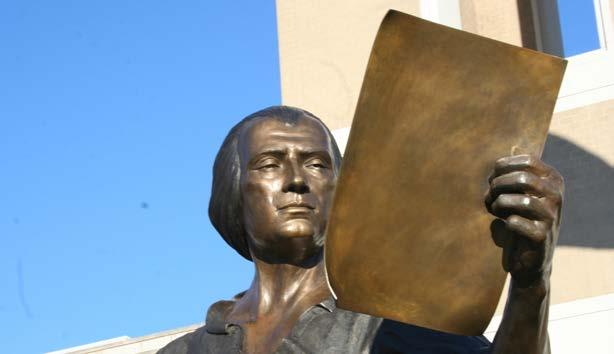
moral authority.” Her warning, issued during his first term, resonates even more deeply now, as the nation’s 47th president has systematically turned a second term into a first-rate crisis, according to a host of critics, including the likes of noted conservative columnist George Will.
“Donald Trump’s legacy will be a demonstration: How a purely transactional politician, untethered from any political philosophy and uninterested in norms of self-restraint (e.g., unforced respect for the separation of powers) can exploit this architecture for unconstrained executive power,” Will wrote in a column appearing in The Washington Post on July 18.
“Trump’s ever-shifting and contradictory rationales for tariffs (curing trade deficits, strengthening national security, punishing ingratitude, etc.) reveal that protectionism is not an economic policy but a political strategy for aggrandizing personal power,” Will declared. “His tornado of tariffs-by-whim produces an endless auction as businesses bid for beneficial
whims: intensifications of, or exemptions from, tariffs.”
Columnist Will then evoked the words of Founding Father James Madison, the fourth president of the United States.
“The subtlest of the Founders, James Madison, used nine laconic words to express the most memorable understatement in U.S. history: ‘Enlightened statesmen will not always be at the helm.’ Those who in 1787 framed our system of checks and balances had this in mind. They could not have imagined the desuetude into which their system has decayed 238 years later,” Will wrote.
“Today’s shambolic civic life, with the public sector dominating and corrupting the private sector, reveals this: The Founders’ elegant architecture of institutions for liberty under limited government guarantees nothing when the institutions are inhabited by the unenlightened.”
Having returned to power amid controversy and division, President Trump has wasted no time reviving his signature brand of governing. His second term is shaped by executive overreach and a deeply personal agenda aimed at settling scores and reshaping America in his own image. This “Revenge Tour,” as some have dubbed it, is being carried out not in whispers but in bold, broad strokes – with the full weight of the executive branch behind it.
From defamation lawsuits against major media outlets to ideological purges of federal agencies, Trump has made clear that this presidency is not one of unity or nation-building but of total domination.
Observers around the world often ask: How is he allowed to do this?
The answer lies in a troubling convergence of factors. First, a deeply polarized Congress has abandoned meaningful oversight. Legislative checks, which are essential in any functioning democracy, have been paralyzed by partisanship.
Republican lawmakers, wary of alienating Trump’s powerful voter base, have largely remained silent – or worse, have cheered him on.
Take House Speaker Mike Johnson, for example, who has repeatedly sung the president’s praises, never more so than on May 22 as the House narrowly passed a massive tax and spending bill.
“Today wouldn’t be possible without the leadership of arguably the most powerful, and the most successful and the most respected president in the modern era of the United States,” Johnson said on the floor of the House as echoes of laughter could be heard in the background.
Second, Trump has installed loyalists across key government positions, from cabinet members to federal agencies.
These appointments ensure his directives are not questioned but executed with enthusiasm.
Third, and most importantly, millions of Americans believe he is doing a good job. For his MAGA (Make America Great Again) supporters, Trump is not dismantling democracy – he is saving it. They see his combative rhetoric as strength, his disregard for norms as authenticity, and his attacks on institutions as long-overdue corrections.
“You have enemies? Good. That means you’ve stood up for something, sometime in your life,” British Prime Minister Winston Churchill once said.
Trump and his backers often cite such quotes to justify actions that in other administrations would be disqualifying.
Polls consistently show a strong approval rating among his base, who praise his stance on immigration, deregulation, and perceived strength on the world stage. They trust him – not the courts, the press, or even the Constitution – to act in America’s best interests.
This unwavering loyalty has created an accountability vacuum that emboldens Trump to operate beyond traditional boundaries. And with the judicial branch under pressure and Congress defanged, that vacuum has grown into a void.
One of the most alarming fronts of Trump’s presidency is his ongoing effort to erode the independence of the American legal system by targeting federal officials,


weaponizing federal agencies, and defying court orders.
Federal judges, once spoken of with reverence by previous administrations, are regularly derided as “biased” or “unAmerican” if they issue rulings contrary to the administration’s interests. Trump’s continued public disparagement of individual judges has emboldened attacks on judicial integrity and opened the floodgates to politically motivated firings and investigations.
In a democracy, the civil service is expected to function as a nonpartisan steward of national interests. Under Trump, that tradition has withered.
The Bureau of Labor Statistics (BLS), for instance, recently came under fire after releasing job figures that the president deemed unfavorable. Those figures showed a net loss of 150,000 manufacturing jobs over two quarters, undercutting Trump’s public claim that “American manufacturing is roaring back.” He called for the dismissal of Erika
McEntarfer, a career civil servant who has served under multiple administrations for more than two decades. Trump claimed, without citing any evidence, that the latest jobs report was “rigged” to “make him look bad,” accusing McEntarfer of manipulating the data.
American Federation of Government Employees President Everett Kelley responded with a sharp rebuke.
“President Trump’s attack on the Bureau of Labor Statistics and his call to fire the long-time federal worker who leads the agency over today’s publication of employment data is outrageous and irresponsible,” Kelley said. “The civil servants at BLS are not political actors. They are professionals committed to producing accurate, independent data, regardless of who is in power. BLS Commissioner Erika McEntarfer, who Trump now wants to fire, has worked in the federal government for more than two decades under multiple administrations.
“Presidents don’t get to blame career workers when their policies don’t deliver. That’s why America’s civil servants collect and report this data – to give the American people the truth, not to make sure the president looks good,” Kelley declared.
Trump has also targeted whistleblowers, scientists, and public health officials who refuse to fall in line with his directives. Agencies like ICE and the FBI have been turned against critics, liberal activists, and journalists. The chilling message is clear: dissent is punishable, and allegiance to the president supersedes duty to country.
One prominent example is Dr. Anthony Fauci, who, after publicly contradicting the administration’s claims about vaccine efficacy timelines, faced federal audits and surveillance. Fauci has since partnered with the World Health Organization to create an international coalition for scientific integrity, stating, “Science does not yield to political convenience.”
On the global economic front, America has become a less predictable partner.

Trump’s trade wars, tariff regimes, and disregard for multilateral agreements continue to destabilize international markets. Global investors once considered America a haven of stability and rule-based commerce; now they face a chaotic regulatory environment shaped by political vendetta.
Moreover, Trump has strong-armed major U.S. law firms into directing more than $1 billion in pro bono work toward conservative causes, a tactic widely seen as coercive. Firms that resisted were targeted by regulatory threats and political smear campaigns. Many multinational firms are reconsidering long-term investment plans in the U.S. amid what one European ambassador called “legal and reputational instability.”
America’s foreign relationships have reached a historic low. Trump’s antagonistic approach toward NATO, his repeated threats to withdraw from mutual defense pacts, and his overtures to
authoritarian leaders have strained even the strongest alliances.
French President Emmanuel Macron lamented at the Munich Security Conference in February that “America no longer leads with values – it leads with threats,” adding “we cannot build a secure world on intimidation alone.”
In an April speech before the House of Commons, British Prime Minister Keir Starmer warned that “American retreat from global responsibility creates space for autocracy and chaos.” He warned, “Where America withdraws, instability rushes in.”
In Canada, Prime Minister Mark Carney emphasized that “the erosion of America’s democratic norms is not just an American issue. It shakes the entire global order.”
In his pointed remarks to the Canadian Parliament on May 21, Carney added, “When the world’s most powerful democracy wavers, the equilibrium of every free society is threatened.”
Most damning is the concern voiced by Ukrainian President Volodymyr Zelensky, who said, “If the United States cannot be counted on to defend democracy, who will?”
Zelensky declared, “We in Ukraine understand that freedom is not free, but we need partners who understand that, too.”
Trump’s war on science continues in his second term with renewed intensity. Federal funding for climate research, public health initiatives, and environmental protections has been slashed. The administration has removed thousands of scientists from advisory panels, suppressed climate reports, and disbanded key environmental programs.
Australia’s Prime Minister Anthony Albanese, whose country is experiencing record-setting climate disasters, expressed dismay.
“The climate crisis demands urgent leadership. America is not only missing, it’s obstructing progress,” Albanese said in addressing the United Nations Climate Conference on June 17.
As soon as he took office in January, Trump directed federal agencies and public institutions to dismantle diversity, equity, and inclusion (DEI) programs, calling them “Marxist” and “anti-American.”
He also launched efforts to “patriotize” school curricula, glorifying colonial history while downplaying slavery and civil rights advances. For example, in February 2025 the Department of Education removed Martin Luther King Jr.’s “Letter from Birmingham Jail” from the national high school curriculum, labeling it “divisive.”
The administration’s aggressive immigration crackdown has caused political and economic turbulence across the nation, creating a maelstrom of fear among immigrants and their families.
Instead, it mandated instruction on “the virtues of early American enterprise.” This sanitization of history is part of a broader ideological push to reshape American identity in an exclusionary, revisionist mold. Education experts and historians warn that this effort undermines not only social cohesion, but also the nation’s commitment to truth and pluralism.
The Trump administration has drastically reduced foreign aid, eliminated funding for global health and climate resilience, and embraced isolationism in humanitarian crises. Refugee admissions have plummeted, and border policies
remain marked by cruelty and chaos, most notoriously seen in the so-called “Alligator Alcatraz,” a sprawling new immigrant detention center in the Florida Everglades. The facility, which was constructed in less than two weeks, is designed to hold several thousand detainees, and is built mainly of tent-like temporary structures and trailers on swampland that’s roughly a dozen feet above sea level, according to an August 4 report in The New York Times. It sits in a wildfire-prone region of the Everglades that also is susceptible to extreme flooding during tropical storms, making the prospect of a mass evacuation problematic at best.
“In recent weeks, detainees have reported backed-up portable toilets, rainwater leaking into tents, and spotty
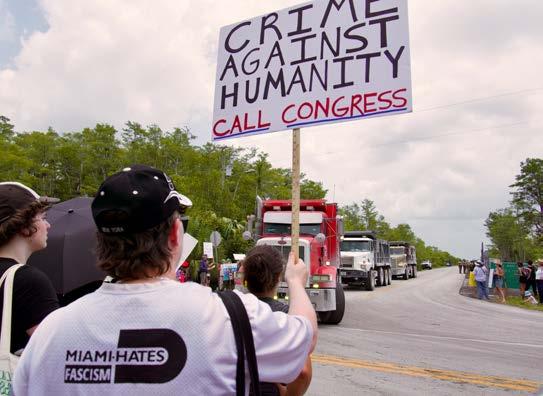
air conditioning,” according to the article. “Lack of infrastructure at the site has meant that drinking and bathing water must be trucked in, and sewage hauled away.”
While detainees also have reportedly complained of mosquito infestations at the facility, Trump during a tour of the detention site in July found humor in it all, declaring, “They have a lot of bodyguards and a lot of cops that are in the form of alligators.” Florida Governor Ron DeSantis, standing by Trump’s side outside a detention tent, chimed in with his own quip: “You don’t have to pay them so much,” he said of the alligators.
The Immigration and Customs Enforcement agency, otherwise known as ICE, is in the midst of a hiring spree, launching a massive recruitment campaign designed to attract more than 14,000 agents to its workforce.
“America needs you,” reads one of the recruiting ads that features a fingerpointing Uncle Sam, reminiscent of the World War I-era recruiting posters. “America has been invaded by criminals and predators. We need YOU to get them out.”
As an incentive to attract new agents, ICE is reportedly offering signing bonuses of up to $50,000 to help execute Trump’s border crackdown. An unintended consequence of the recruitment program is that local law enforcement programs are worried that their ranks will be depleted by officers seeking a bigger payday.
“It is tone-deaf and reflects a total lack of judgment and character on their part,” said Jonathan Thompson, executive director of the National Sheriff’s Association. “This is either galactically stupid or purposefully malicious. You’re just robbing Peter to pay Paul. And in this case, you’re robbing the poorest of Peter to pay the richest of
Paul,” Thompson said of the ICE recruiting program, noting that some sheriff’s offices already have vacancies of 40 percent. The surge in spending for ICE may come at the expense of programs supporting Social Security, Medicare, and Medicaid, according to critics of the administration. America’s long-valued “safety net” programs have come under renewed threat, with budget proposals signaling deep cuts in the name of fiscal conservatism.
These shifts have had a devastating reputational cost, according to retired U.S. Senator Mitt Romney. The U.S. is no longer seen as a generous superpower or a defender of the vulnerable, Romney said in a recent speech, “instead, it is viewed as a self-absorbed hegemon, one whose moral leadership is no longer taken for granted.”
Once a beacon of freedom and creativity, American culture is now facing backlash abroad. International students are choosing other destinations. Artists and writers denounce U.S. censorship and disinformation campaigns. Tourism has dropped in several allied countries where anti-American sentiment is rising. What was once the “American Dream” now appears, to many, as a cautionary tale.
Former House Speaker Paul Ryan, in a speech at Georgetown University in April, added pointedly: “When loyalty to a person eclipses loyalty to the Constitution, we have entered dangerous ground.”
Conservative columnist Dace Potas, in a March 11 column in USA Today, said that America’s standing in the world has been painstakingly built through decades of principled leadership, diplomatic stewardship, and cultural outreach. Under Trump’s leadership, that reputation is in freefall, Potas wrote.
“The Trump administration lacks the moral foundation and conservative principles to truly represent a conservative outlook on American politics,” Potas declared. “Trump’s expansion of power for himself, disregard for norms and the law, and his own character problems warrant criticism from those who claim to be conservative.
“Before Trump, Republicans had a consistent belief system rooted in a handful of core principles, such as limited government and free markets. Now, that is just not true,” Potas maintained.
For now, Potas indicated, the nation stands diminished, not by the judgment of others, but by the choices of its own leader, and the support of millions who believe he is doing exactly what they elected him to do.
“The start of the moral decline was when the Republican Party allowed Trump to be its presidential nominee, despite his many character issues,” Potas wrote. “The rationale for supporting Trump in 2016 was that holding your nose and voting for him was worth it because he was better than the alternative. A similar reasoning was employed in 2024, although by then more of the Republican Party had become Trump die-hards despite his 2020 loss.
“The teardown of the party’s principles led to the reshaping of the GOP for the single purpose of enabling Trump to win elections without regard for the long-term consequences,” Potas noted. “His administration operates with minimal checks and balances because of Republican acceptance.”
America – and the world – are now paying the price.
John C. Buchanan


Let’s begin with a brief bit of presidential history, circa 2017-21, a time when some political observers insisted that we needed to reinvent the ideal of “America the Beautiful.”
By the spring of 2021, a sense of order had been restored to our democratic system of government after a tumultuous four-year reign by a president who was impeached twice, ruled by executive fiat, refused to concede election defeat, and sparked a violent and deadly insurrection at the U.S. Capitol that will forever stain the nation.
Oh, but that’s not all, lest we forget his incoherent handling of the COVID-19 pandemic, an epic health crisis during which he repeatedly downplayed its
seriousness, even suggesting we ingest disinfectant to cure the disease.
When he took to the White House briefing room that day in April 2020, the 45th president of the United States encouraged his top health officials to study the injection of bleach into the human body as a means of fighting COVID, a communicable disease that has claimed more than 1 million American lives in the last five years. His remarks served as a watershed moment in the annals of presidential briefings, symbolizing the chaotic essence of his presidency and his disdain for scientific facts.
That, in succinct terms, was the state of the union after we somehow survived a presidential administration that from 2017-2021 led a full-frontal assault on the
values we treasure as a nation, such as liberty, freedom, equality, opportunity, due process, and economic security.
Tragically, his second term in office has all the makings of another four-year slog that could be even more damaging to our longstanding commitment to democracy, human rights, the rule of law, and telling the truth.
Since taking office in January, the president has unilaterally governed through a series of sweeping and unprecedented executive orders, directives that have allowed his administration to make decisions and implement policies without the direct involvement or consent of Congress.
Congress has been a willing enabler during the president’s so-called “Revenge Tour,” sitting idly by as he gleefully doles out punishment to anyone or any entity that has crossed him during his time in public office and on the campaign trail.
Alarmingly, much of his attention has been focused on the legal profession, particularly major law firms he has targeted whose past work or clients he despised. A number of firms in the Big Law category quickly caved in to the administration’s threats and demands, agreeing in the process to steer about $1 billion in pro bono work to favored conservative causes instead. Others have opted to stand tall against the bullying attempts, filing hundreds of lawsuits against the administration in an effort to form a united front when seeking injunctions and reversals of executive orders.
A Massachusetts-based nonprofit, Lawyers Defending American Democracy (LDAD), has been at the forefront of the fight to protect the norms and values of our democratic institutions. Founded in 2019, LDAD is dedicated to the protection of the rule of law, democracy, and our
fundamental freedoms spelled out in the Constitution. In recent months, LDAD has grown increasingly concerned about the administration’s “retribution agenda” that it seeks to carry out.
“The heart of this retribution agenda lies in the United States Department of Justice,” the LDAD said in a recent prepared statement. “Once the gold standard for a place where lawyers felt honored to serve their country and enforce the nation’s laws in a fair and impartial manner, free from the involvement of the president’s agenda, today the DOJ has become unrecognizable.
“On her first day in office, Attorney General Pamela Bondi issued a memorandum that made clear that the DOJ agenda and the president’s were fully aligned, and it was expected that DOJ lawyers would advocate zealously on behalf of the president, regardless of any ethical constraints they might feel to do otherwise,” the LDAD noted.
Bondi’s memo, of course, is an afront to the justice system, violating one of its core values that no one stands above the law. The president, not surprisingly, thinks otherwise and has made a habit of
challenging any legal guardrails to his executive power.
The threats of retaliation have not been limited to the legal world, as the president also has trained his sights on the media, which he prefers to demeaningly label as the “Fake News Media.” After Paramount, the owner of CBS, agreed to a $16 million settlement in a defamation action brought by the president, he turned his attention to The Wall Street Journal, filing a $10 BILLION defamation case over the paper’s reporting on his relationship with the late convicted sex offender Jeffrey Epstein. In September, he also took The New York Times to legal task, filing a $15 billion defamation lawsuit against the daily, accusing it of being a “virtual mouthpiece” for the Democratic Party.
The defamation suits are just a few of many that the president has filed over the course of his career and have emboldened him to threaten even more now that he has defunded NPR and PBS, in addition to effectively dismantling the Voice of America.


Of even greater alarm, in the days after conservative activist Charlie Kirk was shot and killed during a speaking event on September 10 in Utah, the president didn’t try to lower the temperature to calm a worried nation. He raised it. Speaking to reporters, he said the country has “radicalleft lunatics out there” and that “we just have to beat the hell out of them” – a line that ricocheted across headlines and social media platforms.
Rather than model restraint when it mattered most, he promised a crackdown on perceived “left” enemies, pushing anew to label domestic political adversaries as “terrorists” in a move designed to further chill protected expression.
He simultaneously returned to a longrunning fixation: punishing media critics. After ABC abruptly pulled “Jimmy Kimmel Live!” following the host’s on-air remarks about Kirk’s killing, Trump cheered from the sidelines and urged broader housecleaning against the late-night ecosystem that has long mocked him, a group that
includes Kimmel, Jimmy Fallon, and Stephen Colbert.
That impulse wasn’t just rhetorical scoresettling. The president explicitly suggested that broadcasters who cover him negatively should lose their government licenses, utilizing language that rattled freedom of the press advocates and, importantly, sits at odds with how the FCC actually works.
The Kimmel episode exposed how that pressure plays out. Disney’s ABC, facing a wave of outrage and open hectoring from federal officials, pulled the show “indefinitely.” The president applauded – and, per reporting, pressed the case for other late-night hosts who needle him to be pushed off the air, too. Taken together with CBS’s earlier decision to end “The Late Show with Stephen Colbert” (which the president also celebrated), the president portrayed the retrenchment as a template for dealing with critics.
The hypocrisy glows in neon – at least it should. For years, the president has insisted that conservatives were being “censored” and railed against “cancel culture.” Now he is the one cheering cancellations, muscling regulators, and testing how far a president can go to police speech he deems objectionable. In late August, he even floated the idea that ABC and NBC should “lose their licenses” (or at least pay “millions” in new fees) for “negative” coverage, reflecting a textbook example of using state power to intimidate the press.
All this should send red lights flashing and alarms bells ringing across the country as our society teeters on the brink of a seismic regression thanks to a man on a mission to etch his name in history in a most egregious and self-serving way.
Who else would take joy in slashing foreign aid, a once secure lifeline that supported basic health, nutrition, and stability needs in vulnerable regions around the world?
Who else would eliminate funding to address the climate crisis, a global problem that demands urgent action as extreme weather events grow in number and human cost?
Who else would consider laying waste to such safety net programs as Social Security, Medicare, and Medicaid, long valued for their importance in securing a better life for countless Americans?
Who else would embrace anti-democratic tyrants while ignoring the best interests of our neighbors and longtime allies?
Who else would brazenly promote his business brand while governing, making a mockery of the foreign emoluments clause of the Constitution?
Who else would dream of having his face carved into Mount Rushmore, the national monument to four of the nation’s greatest presidents?
Who else would lead a political crusade to impose his will on nearly all corners of American life?
The answers to these rhetorical questions are obvious and reflect a mountain of evidence that we are being led by a man with nothing but his own aims and fierce ambitions at heart.
History, he may want to know, has rarely been kind to such would-be tyrants, depriving them of the praise and recognition they so selfishly seek.
Best regards,



“Good People Who Happen to Be Good Lawyers” is a trademarked phrase that has personified Primerus since its founding in 1992. Of special note, the first two words of the phrase embody Primerus’ Sixth Pillar, which entails a commitment and devotion to community service.

Offering a helping hand can be an uplifting experience in many respects.
Two prime examples reflecting that desire are highlighted on the following pages, thanks to a pair of Primerus attorneys whose volunteer efforts in their respective communities stand as a testament to the importance of service above self.
By Brian Cox and Tom Kirvan

An exurb of St. Louis, Wentzville is one of the fastest growing cities in Missouri, boasting a population of approximately 50,000 residents. It is home to a GM assembly plant and has ties to Chuck Berry, the pioneering singer and songwriter who was among the initial class inducted into the Rock & Roll Hall of Fame.
Located some 40 miles west of St. Louis, Wentzville is also home to New Heights Tutoring and Mentoring, a nonprofit organization that is dear to the hearts of its founders, attorney Chandler Atkins and his wife, Laura who for two decades have spearheaded a program to boost the fortunes of disadvantaged children in the community.
Their initial idea for the program was modest: to help a dozen or so kids whose families lived in an economically depressed neighborhood known as “The Heights.”
Now, 20 years later, the couple can barely fathom how their modest goal has blossomed into a program that has positively impacted the lives of not just dozens, but hundreds of children.
As college students at Lindenwood University in St. Charles, Mo., Chandler and Laura took part in a Vacation Bible School program through The Crossings Church St. Charles County where they encountered kids whose home lives were disrupted by substance abuse issues and poverty. Many returned at the end of the day to homes where no one was waiting for them with open arms.
“I was particularly struck by a family with six kids living in a small, threebedroom house,” Atkins recalls. “All the kids slept on the floor in one room. There were no beds, no furniture. It was a very troubling situation.”
Even for Atkins, who had grown up in a rural town in southern Illinois and was familiar with limited means, the level of want and need was eye-opening.
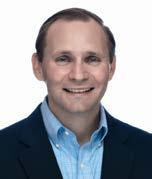

“We wanted to do something to help those kids,” says Atkins, an attorney with the St. Louis law firm of Roberts Perryman P.C. “We were just looking for a way to connect with kids and help them and give them support through the church, and it sort of became a tutoring and mentoring program.”
New Heights Tutoring and Mentoring has since become a 501(c)(3) nonprofit

organization that engages with more than 50 children and their families on a weekly basis. The program first got a church van and then an old school bus to transport kids to activities that range from fishing to visits to a museum or bike riding. Atkins even has his Commercial Driver’s License (CDL), so he can drive the bus.
After the Atkins’ got married, they purchased their first house in The Heights in order to be closer to the families they had come to know through the program.
“We lived in the neighborhood because we wanted to focus on the kids and their families,” says Atkins. “As part of that, we got to know the kids very well. Our house was a kind of safe house where they could come if they needed something. We have lots of great memories hosting kids over the years at our little house.”
They held neighborhood barbecues and volunteered for community projects such as rebuilding the dilapidated local park. The park now is a jewel, featuring a
renovated playground, along with soccer and football fields obtained through a grant based, in part, on community service hours of volunteers from New Heights.
“Some of the families we’ve met through the tutoring program are some of our best friends now,” says Atkins, who has received several awards for his community service, including one from the Missouri Bar’s Young Lawyers Section, a recognition from the lieutenant governor, and being named Volunteer of the Year in law school.
Atkins and his wife remain the program’s directors and now their children are also involved.
“It’s been rewarding for me to see my kids become friends with kids from a very different background,” says Atkins. “I feel it helps connect my kids to how most people live their lives and to how a good segment of our society lives.”
Atkins was raised in a single-parent household by his mother, Kim, who
now manages a dental office after spending much of her career in medical administration roles.
“I spent a lot of time on my grandparents’ farm growing up, learning the importance of hard work,” says Atkins, who enrolled in a local community college on a Pell Grant before completing his college studies at Lindenwood with a degree in history.
“Being raised in southern Illinois, you read a lot about Abraham Lincoln and his legal background, so I was inclined to go that route with my career,” Atkins notes. “And my mom strongly encouraged me to find a profession as my life’s work.”
As a student at St. Louis University School of Law, Atkins discovered that he enjoyed trial work and the courtroom after clinics with the public defender’s office and a legal aid society. A clerking job with Rick Wuestling at the firm Wuestling & James, L.C. in St. Louis revealed a career path for Atkins in insurance defense.
“I was able to see Rick work and assist him with trials,” says Atkins, who credits Wuestling with taking him under his wing. “One of the things I valued about Rick is that he would not just dole out assignments. He would explain the ‘why’ behind what it was you were doing. Rick’s attention to detail is amazing, and the success he has obtained for his clients inspired me to follow in his practice.”
Wuestling recognized Atkins’ ability to communicate well with people and often sent the young lawyer out to talk with witnesses, who related with Atkins and frequently agreed to cooperate with him in obtaining and presenting evidence.
“Rick taught me if you really want to prove what happened, then you really have to analyze the facts and pull out the attention to detail that’s called for in cases,” says Atkins. “And that’s one of the things I like the most about my practice. I like the investigative part, I like the necessary attention to detail, and I like the competitive aspect of trial work.”
Atkins’ practice centers primarily around representing defendants in the areas of wrongful death, trucking and auto
accidents, premises liability, legal malpractice, dram shop actions, and construction site accidents.
“I like representing businesses and clients that I care about,” Atkins says.
He can relate to his clients, many of whom are small business owners “who started a business and are trying to live their lives and raise their families and help their community and then some accident happens.”
The Wuestling & James firm merged with Roberts Perryman about five years ago, a transition Atkins says was seamless. The firm, which has 16 lawyers, focuses on clients consisting of trucking companies, attorneys, and insurance companies. Atkins’ practice group handles insurance defense, insurance coverage, and legal malpractice. Roberts Perryman has been a Primerus member since 2017.
“Through Primerus, we get to work with great lawyers across the country who specialize in the same things we do,” says Atkins, who is involved with the Premises Liability Defense Practice Group and serves on its Executive Committee.
He and his family now live on a wooded lot where they enjoy the outdoors through such activities as fishing, gardening, and hiking. Laura is a high school special education and government teacher. Together they coach a mock trial high school team that several years ago advanced to the state championships. The couple has three children – Landon, 15; Abigail, 13; and Everett, 11.
There is a larger family, too, of course –the one the Atkinses have built through New Heights.
Since starting the mentoring and tutoring program back in 2005, the Atkinses have had the chance to see many of the children involved with the group go on to attend college, start careers, marry, and begin families of their own.
“It’s great to see kids who come from a background that was similar to mine and now they’ve got great families, they’re serving in their community, they’re going to school or have completed school,” Atkins says. “It’s very gratifying and we’re thankful to be part of New Heights.”


By Tom Kirvan

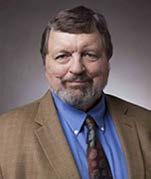
Gary L. Shockey Founder & Principal
Gary L. Shockey, PC
Wyoming attorney Gary Shockey says he is far from a hero, even if he has been a longtime booster and supporter of a multitude of worthwhile charitable organizations in the Cowboy State.
One nonprofit that Shockey has grown particularly fond of in recent years is filled with heroes, so many, in fact, that the word is at the heart of the organization’s identity.
Hunting with Heroes Wyoming came to Shockey’s attention seven years ago thanks to a longtime friend active in the organization that was founded in 2013 by a pair of distinguished U.S. Army vets.
“I’ve always wanted to help veterans as much as I can because of all the sacrifices they have made in service to our nation,” said Shockey, who is the founder of a personal injury firm bearing his name that is based in Casper, the second most populous city in Wyoming. “My father was in the Army during World War II. And from that, he and my mother became very active in the American Legion and American Legion Auxiliary. As I’ve often said, I practically grew up in the American Legion Club downtown.
“So, when the opportunity to help Hunting with Heroes came about, it was an easy decision for me,” added Shockey, crediting his high school friend, Nelda Currah, for sparking his involvement.
The organization, according to its website, “is proud to honor disabled veterans from current and past conflicts with unique programs designed to show our appreciation, respect, and gratitude for all they have sacrificed. We offer a safe environment for fellow disabled veterans to share experiences with each other and an opportunity to heal. We have hosted Heroes from all 50 states, Heroes who have served in conflicts from WWII
to Afghanistan, Heroes from 21 to 95 years old. In 12 years, we’ve given back thousands of times.”
Hunting with Heroes was the brainchild of U.S. Army vets Dan Currah and Colton Sasser, both Wyoming natives who share a passion for hunting in their native state. The two launched the organization in 2013, not long after first meeting at Brooke Army Medical Center in San Antonio, where Sasser was hospitalized after being wounded in action while deployed to Afghanistan in 2012.
“Dan (Currah) is a Vietnam War vet, while Colton (Sasser) lost a leg and suffered other injuries while serving during the war in Afghanistan,” said Shockey. “They have been committed to giving back to our nation’s disabled veterans by providing hunting experiences for them as a way to express thanks for their bravery.”
Each fall, the various chapters of Hunting with Heroes Wyoming host hunts for game such as elk, deer, antelope, turkey, bighorn sheep, bear, and mountain lion, according to Shockey, a former hunter who now prefers to target wildlife with his camera.
“Many of the vets are dealing with PTSD and a number of them don’t have the ability to get out in the wilderness without help,” said Shockey. “Some of the vets are in wheelchairs, but amazingly, they can be accommodated through the ingenuity that many of the volunteers display during the hunts.”
Several of the Wyoming chapters even have a fly-fishing component to the fall outing, offering vets a crack at landing prized trout from some of the state’s world-renowned streams in cooperation with the Project Healing Waters organization.
Shockey said that Hunting with Heroes is dependent on the generosity of donors
to make the adventures happen, while also relying heavily on donated hunting licenses, volunteer guides, and the willingness of landowners to open their properties for hunting purposes.
“On average, we probably have 120-plus hunts each year, sometimes as many as 150,” Shockey indicated. “We have a huge waiting list, which we wish we could accommodate quickly.”
Until they can, volunteers with Hunting with Heroes can take special pride in the collection of testimonials from countless men and women who have benefited from the outdoor experience.
“I am a combat veteran with a Stage III brain tumor and life has been very hard since I left the military,” an Army vet expressed on the Hunting with Heroes website. “I went on the 2018 hunt, and I have never met such kind, open, and warm-hearted people. They took me in and changed my life. There is no way to thank them all enough. I feel invigorated and ready to move forward. Thank you all. My life will never be the same.”
Shockey, who earned his bachelor’s degree from Yale University in 1973, went to law school at the University of Wyoming, working for a year as a public defender following graduation. He then joined a high-profile Wyoming firm led by the late
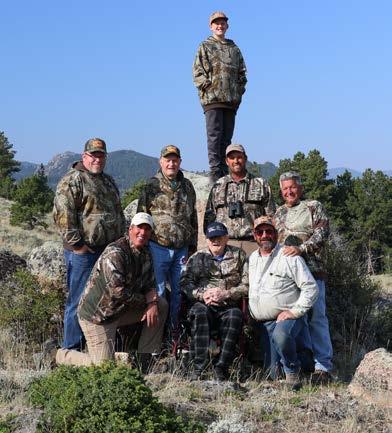
Gerry Spence, the famed trial lawyer with a national reputation for success in both civil and criminal cases.
Making partner in 1982, Shockey often represented workers injured on oil rigs and in mines, deriving special satisfaction in cases that drew upon his interest in and proclivity for science.
The work also touched upon his inherent desire to help the disadvantaged, sparking an urge to be involved in various social service programs and projects. One special note is the Community Action Partnership of Natrona County, a nonprofit that Shockey serves as a member of its board of directors.
“It’s part of the national organization that grew out of President Johnson’s Great Society programs to fight poverty in the mid-‘60s,” Shockey indicated. “There are hundreds of similar organizations scattered across the U.S. that provide shelters, transitional housing programs, health services, and other daily necessities. We help direct and manage federal funds to assist individuals who are homeless, have housing issues, or are having difficulties paying the rent or utility bills.
“We also manage a Healthcare for the Homeless program, which is a full-service clinic for people without access to regular medical care,” said Shockey, a board member for the past four years. “We even have a mobile van that goes around the community to provide health care services to those who lack transportation. We do a lot of important work for those who are struggling in the community, addressing immediate needs while working to remove barriers to long-term stability.”
For years, Shockey also has been devoted to supporting the Troopers Drum and Bugle Corps, a world class competitive junior musical group based in Casper.
Shockey was a member of the Corps from the age of 12 through his teen years as a drummer, calling it a formative experience that opened his eyes to a world of possibilities.
“For those six or seven summers, I got to go to places and see things I never would have,” he said, instilling a belief that “even some ragtag kid from Casper, Wyoming could go anywhere and win and be the best at whatever you’re trying to do” in life.
“My last year, we won every national and world contest we could go to,” Shockey said proudly.
In recent years, Shockey has added to his community service resume by assisting Kind Grounds, a nonprofit that opened its doors in November 2023 and serves “as a hub for people experiencing homelessness to receive a warm meal and connect to vital resources,” according to its website.
Shockey was introduced to the organization by a longtime friend, Marilyn Diamond Wagner, “who has spent many years of her life involved in the nonprofit scene” in Casper.
“Marilyn’s husband passed away many years ago, and my wife (Dona) died a bit over a year ago,” Shockey related. “We now have come together and are engaged to be married. Part of the foundation of our hopes and dreams for each other in getting married is that we team up in these kinds of things together. We both know that the needs are never-ending for people who require help, and we want to do our part to make a difference.”


photographer,


By Tom Kirvan


When Robert Mueller was director of the FBI in 2012, he made a startling statement that reverberated across the corporate world.
“There are only two types of companies: those that have been hacked, and those that will be,” said Mueller, in what amounted to a wake-up call for the guardians of internet commerce.
Ankur Sheth, senior managing director for Ankura Consulting Group, a global services and advisory firm, utilized the Mueller quote as the lid-lifter for a presentation on cybersecurity that he delivered at the Primerus Business Law International Summit in Atlanta (May 1-3).
“This is a business issue, not an IT issue,” Sheth stressed during his fast-paced primer on internet crimes that can spiral into episodes of cyber espionage and cyber terrorism.
The crimes, Sheth indicated, can be perpetrated by “hacktivists,” company insiders, competitors, nation states, those looking for financial gain, and terrorists bent on wreaking economic and societal havoc.
“Cyber intrusions can take many forms and generally involve multiple attempts to breach networks,” Sheth said of the high stakes cat-and-mouse game that computer criminals play as they probe for vulnerabilities in corporate defenses.
The nature of the game is such that even some of the titans of the corporate world – AT&T, Capital One, Marriott, Yahoo, and Amazon to name a few – have been caught in the web woven by cyber criminals, according to Sheth, whose presentation made clear that “cyber-crime has no borders” and dispenses all concepts of time and space.

Sheth, who has spent more than 20 years in cybersecurity across a “variety of competencies and industries” around the globe, said the costs of a data breach are many and extend far beyond mere monetary damages. Companies, he said, need to factor in the costs of business interruption, disaster recovery, reputational impact, business devaluation, potential claims or litigation, and the loss of or damage to customer relationships.
Cyber incidents, according to Sheth, “now rank as the number one global business risk” within the professional services sector – that includes law firms – “increasingly targeted” to the tune of some 20 percent of all episodes in 2024.
Which is why, in recent years, Primerus has heightened its efforts to ensure that member firms are equipped to meet cyber challenges and to be compliant with the latest data security measures. In the spring of 2023, Marc Dedman, then chair of the Primerus Quality Assurance Board and a partner with Barton LLP in Nashville, spelled out the need for a cybersecurity initiative for all Primerus firms.
“In short, Primerus law firms have mounted a counterattack against computer hackers and others, marshaling our forces and legal expertise to recommend a series of practices that our member law firms will adopt to better secure their systems, fortify their networks, and strengthen their data security measures,” Dedman wrote in a letter to member firms. “That counterattack is intended to be focused and strategic. There is an apt quote by Ma Huateng, founder and CEO of Tencent Holdings, that is directly applicable to the intentions and processes for our new cybersecurity initiative: ‘There should be order if the development of the cyber world is to be sustainable.’”
That point was underscored by New York attorney Ken Rashbaum, also a partner at Barton LLP who served as chair of the Cybersecurity Subcommittee that has recommended the Primerus Cybersecurity Standards.
“The Primerus Cybersecurity Standards will serve as an announcement to Primerus clients and to potential Primerus clients that member law firms meet legal,
ethical, and client business requirements for secure controls over their client information and in their law firm advice to clients,” Rashbaum stated at the time. “Going forward, these standards will differentiate Primerus firms from those which do not have these controls over client and firm electronic information and will establish a baseline for clients to know that Primerus firms will take good care of their critical information.”
Sheth, in turn, is helping reinforce the message for Primerus members, stressing that those who are new and naïve users of digital technology are “prime targets for a range of cyber threats, including ransomware, phishing, and nation-state attacks.” His presentation was so wellreceived at the International Summit that Sheth is scheduled to be among the keynote speakers at the Primerus Global Conference, October 9-11, in Santa Fe, N.M.
An alumnus of Penn State University with a degree in information sciences and technology, Sheth earned his MBA from the prestigious Kelley School of Business at Indiana University, spending the first 15 years of his career in a key
cybersecurity consulting role with PricewaterhouseCoopers (PwC).
During his time at PwC, Sheth helped form and develop a portion of its cybersecurity practice into a major revenue-producing sector for the company, earning the opportunity to grow it even more on an international level during his final two years with the consulting firm. Accordingly, he spent much of his time living out of a suitcase, traveling the world while helping “build out the practice group,” Sheth said.
“I traveled the Americas, across the U.S. and Canada, while also working with my colleagues in Brazil, Argentina, the U.K., Germany, and Dubai,” Sheth said of his global role in which he collected dozens of passport stamps. “I also spent time working in Australia, New Zealand, Hong Kong, and Japan. It seemed like I was on the road constantly. Even now, I probably spend 65 percent of my time on the road.”
In 2018, he took a similar job with Navigant Consulting, which a month after he joined was acquired by Ankura. Over the past seven years, Sheth has counseled clients on how to mitigate risks and to develop programs to strengthen their overall cybersecurity posture. In addition, he has written widely on related topics and has become a sought-after speaker on “best practices” for developing an effective cybersecurity strategy.
One of three children, Sheth is a native of New Jersey but spent his formative years in Bethlehem, Pa., the home of Lehigh University, whose notable alums include Lee Iacocca, the former CEO of Chrysler Corp.
“My parents immigrated to the U.S. from India, as my father obtained a second master’s in chemical engineering, working in that field for more than 30 years before retiring,” Sheth said. “My mother began her career as a bank teller and then managed
several bank locations before retiring. One of my sisters is a graphic designer for a school system, while the other has been a model, an actress, and now has authored a series of children’s books.”
A longtime resident of Manhattan, Sheth met his wife, Rashna, at PwC, where she still works helping guide banking clients through the maze of regulatory requirements. Also of immigrant parents from India, Rashna earned her MBA from the University of Michigan, a Big Ten rival of her husband’s two alma maters.
“My wife’s not a big sports fan, whereas I’m a Nittany Lion at heart and I always hope for the best for Penn State whatever the sport,” said Sheth, who serves on
the board of the Penn State Alumni Association for the Information Sciences and Technology College.
While their allegiances might diverge on the alumni fronts, Sheth and his wife do see eye-to-eye in the love for their dog, Iggy, a 40-pound rescue pup that is mainly of the Australian Cattle Dog breed.
“We adopted her two years ago and did the dog DNA and discovered that she has 10 breeds in her, including Lab, Jack Russell, Pit Bull, and Husky,” Sheth noted. “She has a little bit of everything and is very high energy because of her working dog background. But we’re good with that, especially considering how work has dominated our backgrounds.”

By Tom Kirvan

Chosen by Super Lawyers Magazine as a Rising Star in 2024 and 2025, Kelsey Affronte serves on the board of Dawson Place, a nonprofit child advocacy center where “professionals come together to respond to the issue of child abuse.” She also serves on the Snohomish County Judicial Evaluations Committee for the Washington Women Lawyers and was recognized as Chapter Member of the Year in 2023.
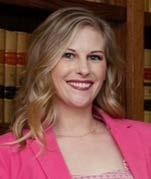
Kelsey L. Affronte Associate Beresford Booth Lawyers

As a child, Kelsey Affronte was a witness to – and then a victim of – repeated acts of domestic violence, the emotional scars of which she would experience from a different perspective in her first job in the legal profession.
Her first taste of life as a lawyer was as a deputy prosecuting attorney in Snohomish County, located north of Seattle, where she worked in the Felony Domestic Violence Unit. It seemed like she was destined for such an assignment after serving in various intern roles in college and law school that focused on assisting victims of domestic and sexual abuse.
“The cases, invariably, are disturbing and, at times, can be emotionally taxing, but the work is so important in bringing a sense of justice to victims,” said Affronte, a trial attorney for the law firm of Beresford Booth Lawyers in Edmonds, Wash., a Seattle suburb.
A 2017 graduate of Seattle University School of Law, Affronte spent more than four years as an assistant prosecuting attorney, managing significant caseloads in a variety of units that involved violent and non-violent crimes.
“Working in a prosecutor’s office is the best way to gain trial experience, which is what I most enjoy about being an attorney,” said Affronte, who has more than 30 jury trials to her credit. “I love being in court. I think that jury trials and jury selection are particularly fascinating, especially in developing a legal strategy and examining witnesses.”
Affronte, who earned a bachelor’s degree from the University of Washington in 2014, has viewed trial work from a different angle in recent years after joining Beresford Booth as an associate in the firm’s Litigation and Family Law Groups where she has focused most of her
attention handling cases involving family law, as well as trust and estates.
The shift from criminal to civil law initially proved to be a somewhat bumpy transition for Affronte, who joined the firm on Valentine’s Day in 2022.
“There definitely was a learning curve where I felt like I was floundering around for a few months before I found my footing,” Affronte admitted. “Coming from a job where I was totally familiar with the legal landscape to one where I was learning something new, virtually every day, was quite an adjustment. Fortunately, everyone here was very helpful and patient, and it didn’t take long to get a handle on what needed to be done for the benefit of our clients.”
The change in focus was aided by her unexpected involvement in a case arising from familiar turf for the former deputy prosecutor.
“I made the move here because I wanted a break from domestic violence work and within the first year, I became involved in a case that came out of Dawson Place, the nonprofit child advocacy center in Snohomish County, where the Sexual Assault Unit is for the Prosecutor’s Office,” Affronte related.
The case stemmed from a divorce action brought by a woman whose oldest daughter alleged that she had been sexually abused by her stepfather.
“When those allegations are made, it just blows up the marriage,” Affronte indicated. “So, the woman and her children pack bags, report the abuse, and go to Dawson Place for various services – including counseling. Eventually, the divorce case comes to us and one of the family law partners asked me to get on board so that I could cross-examine the abusive stepdad at trial.”
Suddenly, Affronte was in her legal element once again, even if it brought back unpleasant memories of the abuse that she (and her mother) had suffered at the hands of her biological father.
“It was great to be able to help out, as I love being in trial and it gave me an opportunity to work on an important domestic violence case without it being my entire caseload,” she said. “Ever since, I’ve been handling more and more family law cases, some in which custody issues are the primary focus and others where money is the central issue. I just had a ‘gray divorce’ – no children – just two days of battling over assets and who gets what.”
According to Affronte, the experience she gained at the Prosecutor’s Office in conducting victim interviews has translated well in divorce cases where the financial stakes can be high.
“For instance, my client might be a wife who has made all these sacrifices to raise a family and to make sure that her husband feels supported at home,” Affronte noted. “She, typically, has been in and out of the workforce during the marriage, so she has no retirement, no savings, and no benefits to call her own. The couple may have been married for 30-plus years, and he wants to keep everything. He doesn’t want to give her anything.”
“So, in a sense, she is a victim of circumstances,” Affronte noted. “There’s no physical violence, in that case, but the emotional and financial toll that she is experiencing is considerable. I’ve come to understand why, for many women, it is such a hard decision to file for divorce when you risk being financially strapped. A lot of people don’t leave an unhealthy marriage principally because of economic reasons. So, I would say a lot of those 300-victim interviews I did at the

Prosecutor’s Office definitely transferred to client work very well, enabling me to feel very connected to my clients very quickly.”
Affronte grew up in Monroe, Wash., a community located 30 miles northeast of Seattle.
“It’s a former farm town,” Affronte said of the city boasting a population of more than 19,000 residents. “It was the
kind of place that on the last day of school, people would drive their tractors to school.”
Affronte’s parents divorced when she was 5 years old, leaving her and a younger sister to be raised by their mother, Michele. The family matriarch, who is a project manager, has been “that angel on my shoulder,” Affronte said.
“She’s a lot of fun and she has always listened to me, bringing me back to earth when things need calming down,” Affronte indicated. “She has been incredibly supportive and watches a lot of my trials on Zoom and came to a lot of my mock trials in law school.”
The first person in her family to earn a graduate degree, Affronte said she knew from an early age that she would pursue a career in law.

“Some of the messages in my senior yearbook were like, ‘Can’t wait to see what type of attorney you turn out to be.’ I’ve known that I wanted to be an attorney for a really long time. It was just a matter of what kind,” Affronte noted.
During law school, where she was a member of the Moot Court Board and excelled in moot court competitions, Affronte performed a clerkship with King County Superior Court Judge Barbara Mack, whose community service work revolved around efforts to combat child sex trafficking.
Affronte’s clerkship experience led to an opportunity during her 2L summer to work on a civil case brought against Backpage.com, alleging the website played a role in facilitating sex trafficking by allowing the posting of ads that exploited minors.
“I learned a lot about the discovery process and how important it is in the eventual outcome of a case,” Affronte said, noting that the legal efforts ultimately led to the website’s demise in 2018.
When Affronte joined Beresford Booth Lawyers in 2022, she was the firm’s 12th attorney, which has since grown to 25 in the span of three years. Founded in 1946, the full-service firm is the largest in Snohomish County.
The law firm, which has been a member of Primerus for more than 15 years, sent four of its attorneys in March to the 2025 Young Lawyers Section Conference in Fort Worth, Texas.
“It was an incredible experience and an absolute blast,” said Affronte, who was joined at the conference by her Beresford Booth colleagues Dexter Bradford, Mackenzie Bretz, and Caleb Tingstad.

“We all met so many interesting and talented young lawyers. It was just great to hear from other attorneys who were getting started with new firms and how they found their way into certain practice areas. It was a great opportunity for all of us to gain legal insights and to build professional relationships.”
The feature session at the conference, according to Affronte, was titled “From ‘Likes’ to Leadership: Mastering Relationship Building Online and In-Person.” The program was led by
Amber Vincent of Alyn-Weiss & Associates, a marketing consultant who shared details of how to build authentic relationships that can help bolster one’s reputation and career success.
“Amber Vincent is a force to be reckoned with,” Affronte exclaimed. “I would love to have her on my speed dial to talk with anytime about marketing and related career matters. She had so many great ideas to share.”

By Brian Cox
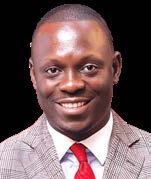
When attorney David Yaw Danquah founded Legalstone Solicitors in Accra, Ghana, he had a clear vision – build a law firm that embodies excellence, integrity, responsiveness, and honesty. These principles, he believed, would serve as the foundation for a firm that clients could rely on for unwavering legal support.
“We wanted a name that reflects our commitment to understanding, protecting, and defending our clients’ interests,” said Danquah.
Inspired by biblical references to a cornerstone as a symbol of strength and stability, Danquah chose the name Legalstone Solicitors to represent the
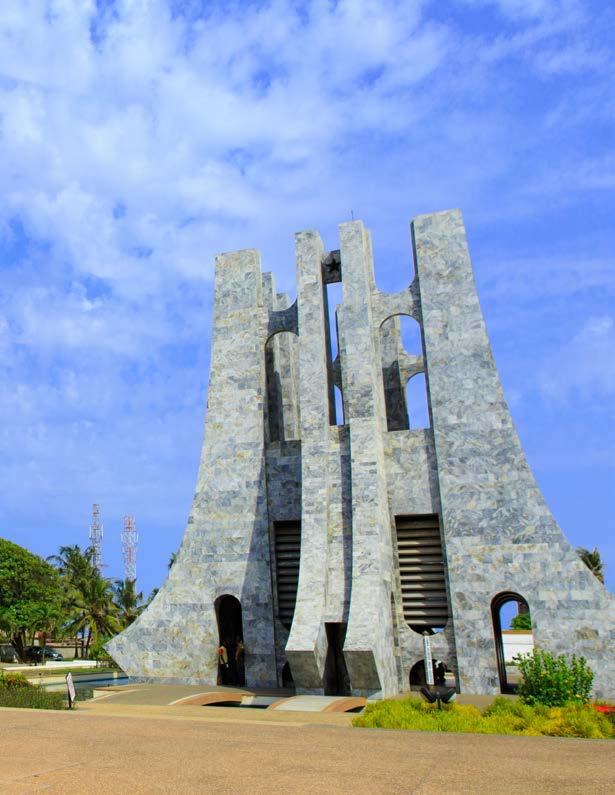
firm’s resilience and dedication to delivering exceptional legal services.
Since its inception, Legalstone Solicitors has grown into a formidable legal practice, specializing in corporate and commercial
The Accra office of Legalstone Solicitors features a modern and inviting look that dovetails with the


law, mining and infrastructure, debt recovery and restructuring, real estate and construction, international family law, gaming law, and commercial arbitration.
From the outset, Danquah was determined to create a firm that would provide strategic legal counsel to local and international businesses operating in Ghana. His legal journey began after earning a Qualifying Certificate of Law from the Ghana School of Law and being called to the Ghana Bar in 2014.
Early in his career, during his pupillage at a litigation firm, he realized that his passion lay not in courtroom battles but in corporate advisory work, helping businesses navigate Ghana’s legal landscape. This realization fueled his ambition to establish his own firm – one that would focus on structuring deals, facilitating cross-border transactions, and
advising multinational companies entering Ghana’s market.
Like any ambitious venture, launching Legalstone Solicitors came with challenges. In its early days, the firm operated from a client’s office space before securing its own rented premises. Over time, Legalstone grew into a respected law firm with its current office in East Legon, Mempeasem, Accra.
“We have built a solid foundation, and we are now in a phase of strategic expansion,” said Danquah. “Our goal is to continue attracting top legal talent who align with our values and are committed to the firm’s growth.”
What sets Legalstone Solicitors apart is its dedication to understanding the
business objectives of its clients and providing tailored legal solutions. The firm takes a proactive approach, ensuring that clients anticipate legal risks and capitalize on opportunities in Ghana’s evolving regulatory environment.
Rather than looking to external mentors, Danquah has been guided by fundamental principles that emphasize discipline, strategic thinking, and perseverance. He draws inspiration from books such as “The Richest Man in Babylon” by George S. Clason, which underscores the importance of financial wisdom and foundational principles for success.
“I’ve reached this stage not by replicating someone else’s journey but by staying true to core values that drive success,” he affirmed.
As Legalstone Solicitors continues to grow, its commitment remains unwavering: to provide cutting-edge legal solutions that empower clients in Ghana and across Africa. The firm is actively expanding its footprint and refining its services to meet the demands of an increasingly complex business landscape.
“At Legalstone, we are more than just legal advisors – we are partners in our clients’ success,” Danquah emphasized.
“Our mission is to leverage our expertise, innovation, and dedication to excellence to sustain and protect our clients’ business interests.”
With its firm foundation, clear vision, and steadfast principles, Legalstone Solicitors is well-positioned to remain a leader in corporate and commercial legal practice in Ghana and beyond.
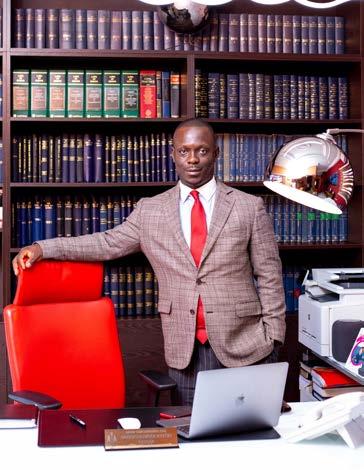

By Tom Kirvan
hana, a country in West Africa that was a pioneer in the continent’s journey to independence, is a land of diverse cultures, stunning landscapes, and golden beaches.
Ghana is home to a population of approximately 34.6 million people, making it one of the most populous countries in West Africa. The country is bordered by the Atlantic Ocean and the Gulf of Guinea to the south, the Ivory Coast to the west, Burkina Faso to the north, and Togo to the east. The geography of Ghana is diverse, ranging from coastal savannahs and tropical rainforests to the rolling hills of the Volta Region, which includes one of the largest man-made lakes in the world.
Accra, the capital city of Ghana, is a metropolis that serves as the political,

economic, and cultural hub of the country. With a population of more than 2 million people, Accra is a city that truly never sleeps, offering a blend of modernity and tradition. Visitors to Accra can explore the bustling markets of Makola, relax on the sandy beaches of Labadi, or immerse themselves in a colorful nightlife. The city’s cultural offerings are reflected in its numerous museums, colonial architecture, and historic landmarks, such as the Independence Arch and the Kwame Nkrumah Memorial Park.
Mount Afadja, also known familiarly as Afadjato, is the highest point in Ghana, standing at an elevation of 2,904 feet above sea level. Located in the Volta Region near the border with Togo, the peak offers breathtaking views of the surrounding landscape. The hike to the summit is a popular activity for adventure
seekers and nature enthusiasts, providing an opportunity to experience the region’s rich biodiversity, including unique plant species and birdlife.
Ghana’s history is rich and varied, with evidence of human habitation dating back to the Paleolithic era. The country was home to several powerful empires, including the Ashanti Empire, known for its wealth, advanced governance, and military prowess. The Portuguese were the first Europeans to arrive in the late 15th century, followed by the Dutch, British, and other colonial powers. Ghana became the first African country to gain independence from colonial rule in 1957, under the leadership of Dr. Kwame Nkrumah. A major exporter of gold and other precious minerals, Ghana also sports a growing oil industry.
A breathtaking sight, the Wli Waterfalls serve as a popular destination for nature lovers.

1. Cape Coast Castle: A UNESCO World Heritage Site, Cape Coast Castle is one of the most significant historical landmarks in Ghana. Built by the Swedish in the 17th century, the castle played a central role in the transatlantic slave trade. Visitors can tour the dungeons, learn about the harrowing history, and pay their respects at the “Door of No Return.”
2. Kakum National Park: Located in the Central Region, Kakum National Park is a haven for nature lovers. The park is famous for its canopy walkway, a series of suspension bridges that offer a unique perspective of the rainforest. The park is home to an extensive list of wildlife, including elephants, antelopes, and more than 250 species of birds.
Harmony ‒ Dignity ‒ Justice
FAST FACTS:
Languages: English, Akan
Religions: Christianity, Islam
Capital: Accra
Population: 34.6 million

Highest Point: Mount Afadja (2,904 feet)
Primerus Member: Legalstone Solicitors
A boutique business law firm located in Accra
3. Mole National Park: Ghana’s largest wildlife refuge, Mole National Park, is located in the northern part of the country. Visitors can embark on safari tours to see elephants, buffaloes, antelopes, and warthogs in their natural habitat. The park also offers guided walking tours and birdwatching opportunities.
4. Wli Waterfalls: The highest waterfall in West Africa, Wli Waterfalls is located in the Volta Region near the town of Hohoe. The falls are surrounded by lush greenery and offer a refreshing escape for visitors. The hike to the upper falls is moderately challenging but rewards trekkers with stunning views and a chance to cool off in the natural pools.
5. Lake Volta: One of the largest artificial lakes in the world, Lake Volta spans several regions in Ghana over 8,502 square kilometers (3,283 square miles). The lake offers various recreational activities, including boating, fishing, and birdwatching. The Akosombo Dam, which creates the lake, is an engineering marvel and a significant source of hydroelectric power for the country.

By Tom Kirvan


E. Celichowski Shareholder
O’Meara Wagner, P.A.
In an earlier iteration of the Minneapolis-based firm of O’Meara Wagner, P.A., Chris Celichowski landed a job as an associate in its Workers’ Compensation Practice Group in a somewhat unorthodox way: while relaxing in the warmth of a hot tub.
“There’s actually a somewhat funny story behind that,” Celichowski said, in an effort to explain the rather unconventional setting for a job interview.
At the time, Celichowski was serving as a summer associate for the firm and in his off-hours had just completed a swimming workout at a health club when a dip in the hot tub beckoned. Just by chance, Jon Iverson, one of the partners in the firm (then known as Chadwick, Johnson & Condon) also happened to be in the hot tub and began chatting with Celichowski about whether “I would like to work for the firm long term and would I consider doing ‘work comp’.”
Somewhat surprised at the line of questioning, Celichowski “was kind of answering, ‘Yeah, sure, I’d be interested,’ not knowing that the partner was really gauging whether I would want a job with the firm’s workers’ compensation group.”
Within a matter of a few days, Celichowski was presented with a formal offer to join the firm.
“So, I think that my first job interview for an associate position with the firm, per se, was in a hot tub,” Celichowski said with a grin.
Now, nearly four decades later, Celichowski remains one of the anchors of the firm, helping lead its well-regarded Workers’ Compensation Practice Group.
“I’m very fortunate to have had great mentors and colleagues with the firm from the day I started,” he noted.
“Jon Johnson was an unbelievable mentor professionally, but also as a human being and a family man. He really got our work comp group going, but over the years there have been others that have done a lot to grow and develop it. Mary Kohl, who retired in 2015, and my colleagues Mark Wagner, Jeremy Rosenberg, and Kris Ryan have been crucial anchors to our practice.”
A 1988 alum of the University of Minnesota Law School, where he served as the managing editor of the Journal of Law and Inequality, Celichowski has been the firm’s managing partner during five separate stints, the most recent during 2022-24.
In his practice, he represents clients in a variety of matters involving workers’ compensation, subrogation, employer liability, employment, and OSHA defense matters. Earlier in his career, he also represented bars and restaurants in auto liability and dram shop cases. In addition, Celichowski is a lecturer on assorted legal topics, presenting to audiences of claims professionals, trade and industry groups, and attorneys.
“This firm has been a happy home for me and quite a few others for many years,” said Celichowski of O’Meara Wagner, P.A., which traces its roots to 1973. “One of our paralegals, Sherrie Hunt, just celebrated her 45th anniversary with the firm, and three of our attorneys have been here 35-plus years, while a bunch of others have been with us for over 20 years. Continuity through change has been a real strength of the firm.”
A native of Wisconsin, Celichowski grew up in the Milwaukee area. His late father, John, was a dentist, while his mother, Camilla, was tasked with raising the couple’s five children, including Celichowski and his identical twin brother, John, the older of the two boys by a matter of minutes.
Home of Celichowski’s favored Green Bay Packers, historic Lambeau Field opened in 1957 and sports a seating capacity of nearly 82,000, making it the second largest stadium in the NFL.

Both twins attended the University of Wisconsin-Stevens Point (UW-SP) and ran cross country and track for the Pointers.
Chris graduated from UW-SP, while John transferred and earned his undergraduate degree from UW-Milwaukee. Both went on to earn law degrees, John from Georgetown Law Center and Chris from the University of Minnesota. A Capuchin priest, Father John also holds a Master of Divinity degree from Catholic Theological Union and now serves as Director of Provincial Ministries and Human Resources at Capuchin Franciscan Province of St. Joseph in Detroit.
Aside from their academic and professional accomplishments, the brothers have shared a talent for distance running (see related story starting on page 44) and a lifelong love of the Green Bay Packers, which is a birthright sort of thing for those born in the state known as “America’s Dairyland.” Celichowski proudly observed that his four children, all born and raised in Minnesota, are also big fans of the neighboring state’s Green and Gold NFL team.
As a college student, Celichowski considered pursuing a career in radio broadcasting or in journalism.
“I wrote and served in various editorial roles for the school newspaper, including a year as editor-in-chief, so I really gave journalism a thought as a career path,” said the 62-year-old Minnesotan whose grandfather worked for The Milwaukee Journal (Sentinel). “I enjoyed writing and wanted to be a journalist. My junior year, I took an undergraduate course in constitutional law and my professor said, ‘You’re really good at understanding these cases, so you might want to consider law school.’”
After gaining admission to law schools at the Universities of Wisconsin and Minnesota, Celichowski decided to go outof-state even though he had never crossed the border and set foot on the school’s campus in Minneapolis.
“I just kind of went on faith, since it was a well-regarded law school and was located in a major city,” Celichowski said. “It’s a law school that climbed in the rankings
since I went there, so I’m not sure I would be able to get in now.”
Such humility has served Celichowski well over the course of his career, as he believes strongly in treating everyone involved in the legal process with civility and respect whether they are an ally or an adversary.
“We are fortunate that in Minnesota, we generally have a very civil workers’ compensation bar. The attorneys that practice in work comp try to avoid burning bridges with each other,” he observed.
“You never want to torch a bridge because you may need to cross it on another journey.
“Workers’ compensation proceedings can get contentious, especially when you’re dealing with a party that has been injured on the job, may feel that they have not been treated fairly, and are wrestling with substantial medical expenses and a loss of income,” Celichowski noted.
“Of course, my clients – the employers and insurers – have their own legitimate views about whether the injury is workrelated, the extent of disability, and benefits claimed, etcetera. Claimants often experience financial stress from claims, so it’s easy to forget that these cases also create substantial ‘pocketbook’ risks for businesses. And, those types of conflicts can create difficulties, even in a ‘no-fault’ statutory system like work comp.”
When it comes to the extent of a claimed injury and claims for substantial wage loss, medical, and other benefits, these issues can trigger prolonged and memorable proceedings, according to Celichowski. As an example, he recalled one case in particular.
“In that case, the claimant asserted a severe back injury that kept him out of work for over a year. My client admitted
a minor strain injury but denied that the worker had a serious back injury. We went to a mediation and the demand was $125,000 to settle,” Celichowski recalled.
The severity of the injury was soon called into question after the claimant posted multiple videos and photos on public social media accounts, “participating in multiple softball tournaments after he ‘hurt’ his back,” according to Celichowski.
“The claimant posted a 45-minute session in a batting cage just wailing on the ball,” added Celichowski. “When my client saw that, they hired a private investigator to go out and confirm that the claimant was participating in softball tournaments during a time he claimed his back injury prevented him from working.”
After confronting the claimant’s attorney with the video evidence, the parties agreed to settle the case for $5,000.
However, the claimant “backed out of the settlement and hired a different attorney who wanted multiples of $5,000 to settle.” The case eventually went to trial and Celichowski secured a complete defense verdict for the company.
“Of course, I’ve lost cases, too,” he conceded. “In Minnesota, the percentage of litigated workers’ compensation claims is quite low, and a very high percentage of contested cases settle. People on both sides appreciate and value certainty, and settlements provide that assurance. The challenge is, through the process of negotiating and resolving the case, to have both sides achieve a rough sense of justice and fairness,” said Celichowski. “And it all starts with being prepared, working hard, and committing yourself to the end goal – in this case, providing your client with a good result.”
Celichowski shares that philosophy of “hard work, perseverance, and striving for excellence” with his wife, Bonnie Sons, and their four adult children, Chantel, Colette, Bennett, and Gavin. Sons has spent the bulk of her career in the information technology field, working for such companies as Lee Data, Northwest/Delta Air Lines, and now Cummins, the multinational company that manufactures engines and assorted other power products. The couple has been married for 36 years, and their children have carved out careers in the forensic science, private equity, and information technology worlds.
“We are very proud of all of them, who they uniquely are as people and what they’ve accomplished. The best part is that they – and our three grandchildren – all live within 15 minutes of us, so we get to see them often,” Celichowski said with a smile.

By Tom Kirvan

With more than 425,000 residents, Minneapolis has long been a hotbed of running in the state.

Figuratively speaking, the sport of running runs in the blood of Minnesota attorney Chris Celichowski and his wife, Bonnie Sons, a three-time All-American distance star during her collegiate days at Iowa State University.
While neither he nor his wife are prone to speaking in cliches, Celichowski readily admits that he “could talk all day” about the running exploits of his spouse, whom he met in his third year of law school at the University of Minnesota.
“We were both members of a running club comprised of post-collegiate runners,” Celichowski said. “It was called ‘Club Sota,’ and we competed in road races, track races, and the like. We met in the running club, got engaged four months later, and were married the following year.”
The quick courtship, undoubtedly, was in keeping with being fast on their feet, a quality that the couple shares to a considerable degree.
Celichowski played football and basketball in high school at St. Lawrence Seminary in Wisconsin, while his twin brother, John, excelled in cross country and track for the Hilltoppers. In fact, John earned state runner-up finishes in cross country and track and still holds the 3,200-meter school record.
Celichowski, prompted by John, started competing in cross country and track during his sophomore year at the University of Wisconsin-Stevens Point, enjoying some success as a varsity runner for the Pointers and serving as the captain for both teams. Following graduation from law school, he began competing in road races and marathons, including such notable marathons as Boston, Grandma’s in Duluth (Minn.), and Twin Cities in Minneapolis-St. Paul.
“Boston, with all its history, was probably my favorite in terms of the overall experience,” said Celichowski, who has eight marathon finishes to his credit. “But Grandma’s was my first and my best. My only regret there was that I went out too fast and paid for it in the last few miles. It was a live-and-learn experience for me.”
Despite hitting the proverbial marathon wall during the home stretch of the 26.2-mile race between Two Harbors and Duluth, Celichowski crossed the finish in 2:34, sporting a blazing pace of 5:54 per mile over the scenic course bordering Lake Superior.
“I might have broken 2:30 if I had paced myself better during the early portion of the race,” he said with a twinge of disappointment.
If he had started at a more measured pace, Celichowski might now have marathon bragging rights over his brother, a lawyer and Catholic priest in Detroit, who has a personal best of 2:30, a 5:44 per mile pace.
“I’ve run faster for shorter distances, but John is the king of the marathon, no doubt,” said Celichowski.
Sons, however, rates as the real running star in the family, earning all-state honors in high school and All-America acclaim for the Cyclones of Iowa State during college.
“Bonnie excelled in cross country and track in college,” her husband noted. “She has a lifetime best of 32:50 in the 10K on the track, and she held the ISU 10K school record for over two decades.”
During her junior year at Iowa State in 1985, Sons sparked the Cyclones to a surprising second place finish in the NCAA Division I Cross Country Championship in Milwaukee. Sons led a pack of teammates across the finish line, placing 25th

overall with a time of 16:59 on the snowy 5-kilometer course.
“After graduating, she remained a very competitive road runner even while giving birth to and raising four children,” Celichowski effused. “She’s won many road races over the years, including five victories at the Dam-to-Dam 20K in Des Moines, and she has a personal best of 2:46 in the marathon.
“She also competed in the 2000 Olympic Trials for the marathon,” Celichowski said of the event in Columbia, S.C. that attracted the likes of Joan Benoit Samuelson, the 1984 Olympic gold medalist.
As the decades passed, Celichowski and Sons have kept running, even though they have slowed down and embraced other forms of exercise.
“We’ve tried to pay forward many of the benefits we received from running and fitness,” Celichowski said.
In 2001, they started the Minnetonka Running Club, a summer running program for kids age 5 to 13, guiding the youth group for 15 years.
“A few of the summers, we had over 100 kids in the program,” Celichowski recalled. “We wanted to introduce kids to running and track, but we really wanted them to embrace the benefits of lifetime fitness.”
In 2010, Celichowski and Sons helped start the Tonka Turkey Trot 5K, a Thanksgiving Day road race that benefits the Minnetonka Track & Field and Cross Country Association (MTFCCA), a high school booster club.
“The first year, we only had 50 or so runners,” said Celichowski.
From that humble beginning, the 5K event has grown to become a community
tradition for many area families, attracting between 1,800 to 2,000 participants each Thanksgiving morning.
“We’ve been blessed with a core of consistent volunteers, who have been part of organizing and producing the event from the beginning,” Celichowski stated.
“The school district has helped with staging the event, we’ve had generous local businesses who have helped sponsor it, and, of course, the folks that show up every Thanksgiving morning to run and walk, regardless of the weather, make it all worth it.
“Running has been a big part of our lives, no doubt,” Celichowski acknowledged.
“The trophies and fast times have been great, but I think we are prouder and more grateful that we’ve been able to promote the sport and a lifetime of fitness. Not all of our kids were or are runners, but they’ve all competed in sports, they benefitted from the lessons that athletics provide, and as adults they all have daily fitness routines that enhance all facets of their busy lives. That’s a legacy that will last after the glories fade and the trophies lie in boxes.”



By Brian Cox

Partner Brödermann

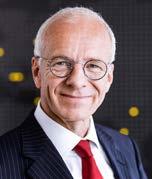
Partner Brödermann Jahn
At the end of “Casablanca,” as Humphrey Bogart strolls off into the fog with Claude Rains, he delivers one of the most iconic last lines in the history of cinema: “Louie, I think this is the beginning of a beautiful friendship.”
For attorneys Eckart Brödermann and Andreas Schulte, the beginning of their friendship – and partnership – took place over engaging conversation and good white wine at a Hamburg Bar Association gala. The two lawyers and their wives sat at the same table and enjoyed each other’s company.
“We had a very nice evening chatting about normal stuff,” says Brödermann. “Nothing about law, and that’s always a nice starting point.”
That evening was the origin of Schulte eventually becoming a partner at Brödermann Jahn, the international business law firm Brödermann founded in 1996.
Brödermann and Schulte knew of each other and their professional paths crossed occasionally over the years. Both were well established, with impeccable reputations in the wider German legal community.
Schulte had worked as a commercial lawyer in Hamburg for more than three decades and was recognized as an expert in IP law. He also had been chair of the local Hamburg Bar Association for years. Similarly, Brödermann had spent nearly as long focused on international transactions, as well as international arbitration and litigation, and had long served on the board of the national Hamburg Bar.
Sometime after the gala, Schulte was looking for advice on an issue dealing with international commerce and reached
out to Brödermann and his law firm, Brödermann Jahn, renowned for its crossborder competence. In turn, Brödermann Jahn looked to Schulte when it was in need of IP law expertise. As it turned out, many of Schulte’s clients, including the largest furniture producer in Germany, increasingly had complex concerns surrounding international trade.
Brödermann and Schulte recognized they could help each other.
“That was the beginning of this,” says Schulte. “Later we discussed whether we could work together. We both had the feeling it was a perfect fit.”
“We have always been doing trademark work, as you do if you’re an international firm,” says Brödermann, “but as of April last year, the firm was lacking an IP counsel. It is much better to have a partner than if you just find counsel on a case-by-case basis.”
Over the next several months, the two lawyers met to discuss how they might work together. They swapped stories of legal battles from their careers and negotiated a bit. They did what lawyers do and started putting an agreement together in writing.
“But in the end, we decided to just tear it apart,” says Brödermann with a laugh. “We decided to join forces. We are partners. The long stuff we didn’t do.”
Schulte joined the firm as a partner in January. He brought with him 1,650 trademark files. His clients’ trademarks have extended into numerous countries, including the U.S., Thailand, Turkey, Georgia, and Israel.
“We have a lot of nice and very interesting cases together now,” says Schulte, who has long-standing clients in the food and non-food sectors.
With Schulte now on board at the firm, Brödermann is excited by the prospect of creating IP license agreements under UNIDROIT Principles, which set forth general rules for international commercial contracts and are useful when parties from different legal systems desire to agree on a neutral contractual regime. Brödermann has lectured and written extensively on this state-of-the-art tool.
“There are very few firms who know how to combine IP law with UNIDROIT Principles,” says Brödermann, “but we do it all the time, with China, with India, with the U.K. We’re able to jointly offer a product that very few other firms have at their fingertips. We can offer top trademark work in Germany and Europe, but we can also offer work on international licenses under the UNIDROIT Principles.”
Both Brödermann and Schulte had seen firm mergers that worked and many that didn’t. Drawing on that experience, they are determined to make the new


partnership work and believe that an important aspect of its success is integrating the younger generation of lawyers into the IP law practice.
“So, we said from day one, the goal is that, within the next two years, we want the more junior lawyers to be able to handle this kind of work,” explains Brödermann.
Toward that end, the partners are holding weekly hour-long sessions where young lawyers can learn first-hand about the intricacies of IP law. Schulte discusses strategic approaches to IP topics and actual cases with the attorneys, who learn how to excel in IP law. The partners’
plan calls for 80 sessions over the next two years.
“It’s like a university course where one of the lecturers has long-term experience in these cases,” says Schulte, who also has years of experience trying cases in court. “What I really like very much is that I have these young lawyers that I can train on cases.”
“I think it’s a great way of bringing in the young team, who also get to know each other better by discussing IP law,” says Brödermann. “You only develop energy and create something new if you invest time. If you don’t invest time, it doesn’t
come. Occasionally, I have the chance to add aspects of private international and comparative law.”
The sessions are also occasionally used as an opportunity for networking. Brödermann has invited Primerus members who specialize in IP law from around the world to be guest speakers.
“We love to cooperate with our Primerus colleagues and hope that they think of us when they think of Germany or Europe,” says Brödermann. “If we want to do something, we want excellence.”

By Brian Cox

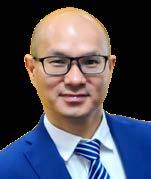
Anh Hung Managing Partner BROSS & Partners
In 2008, five ambitious young attorneys in Hanoi, Vietnam, came together to form a new law firm. Because they were all the same age and were former classmates in law school, they saw themselves as a band of brothers.
So, they called their new firm BROSS & Partners to reflect that brotherly sentiment.
“We wanted to set up a law firm in which all the attorneys and staff would be considered members of the family,” says Tran Anh Hung, a founding member and the firm’s managing partner. “That is one reason we try to strengthen the relationship between all our lawyers, because we want to have a very close connection.”
Born in Hanoi City in 1976 – only a year after Vietnam was unified as a country – Hung has lived through his country’s remarkable transformation from an underdeveloped, isolated economy, largely dependent on subsistence farming, to a vibrant, expanding economy that boasts robust manufacturing and export sectors and enjoys wider access to foreign investment.
In the early years, after war ended in Vietnam, the country struggled with poverty under centralized economic planning modeled on the Soviet Union.
“The country was very poor,” recalls Hung. “People worked in factories or rice fields. The state took care of everything from housing to food to clothing to transportation. It was a hard and difficult time.”
His father was an electrician in a factory not far from Hanoi City and his mother was an accountant.
“They did not work in the legal field, but they always valued education and highly encouraged me to pursue knowledge
persistently,” says Hung. “Growing up in a family that emphasized integrity and diligence had a profound influence on my career.”
In the early 1980s, Vietnamese government recognized that the country was on the brink of economic collapse and instituted dramatic economic reforms. The government transitioned from a state-controlled centralized economy to a market-oriented economy and lifted restrictions on foreign trade and investment.
In addition, the government began allowing private ownership in agriculture and small businesses. It dismantled collective farming and returned land-use rights to farmers, encouraging them to produce rice and other foods.
The timing of the economic reforms coincided well with Hung’s interest in pursuing a career in law.
“From a young age, I was drawn to solving problems logically and helping others,” he says. “I thought becoming a lawyer would be a very good opportunity for me to help people.”
The law offered Hung a challenging intellectual pursuit and an avenue to contribute positively to society, especially at a time in Vietnam when legal careers were only beginning to emerge.
After completing high school, Hung attended Hanoi Law University, Vietnam’s leading institution for legal education.
While there, he encountered influential professors who mentored him and deepened his passion for law, including Professor Pham, who had a tremendous impact on Hung’s development as a law student.
“He taught me not only legal knowledge but also how to listen, how to communicate, how to maintain persistence, and how to become a professional lawyer,” says Hung. “I think his guidance helped me a lot to shape my logical thinking and leadership style. His example continues to influence how I manage my work and how I mentor young lawyers today.”
As Hung witnessed Vietnam’s economic reforms take root and bear fruit, he recognized the opportunity business
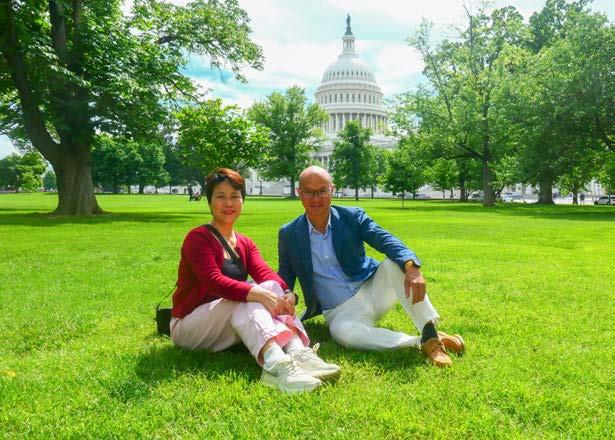

law offered to advise the increasing number of foreign investors who came to Vietnam seeking a wide range of investment projects.
When he graduated from law school in 1998, he interned with a law firm where he gained an early education in mergers and acquisitions and corporate law. He later worked with both foreign and local law firms, becoming experienced in commercial and contract law, as well as dispute resolution and litigation.
Now a managing partner at BROSS & Partners, Hung has been ranked as a Distinguished Practitioner in Vietnam by Asialaw Profiles, Litigation Star by Benchmark Litigation Asia Pacific, and Notable Practitioner by the IFLR1000/ Asia Pacific 2024. He is also listed in Vietnam’s Top 100 Lawyers by The A List – Asia Business Law Journal. He is the
visiting lecturer of a legal training course for entrepreneurs and enterprises and is a regular guest speaker on television programs where he discusses policies dealing with corporate, investment, and securities laws in Vietnam.
BROSS & Partners joined Primerus in 2023 as part of its ongoing efforts to expand its reach. With three locations in Vietnam, including Hanoi City, Hung says the firm benefits from the access to a global legal network that comes with Primerus membership.
“It took several years to join,” he says, “I’m very proud to be a member of Primerus, not only for business purposes, but also for the personal relationships it affords.”
Hung says the key to the firm’s success has been its ability to attract clients and maintain strong relationships with
them. He also stresses the importance of mentoring young attorneys to prepare them for future leadership roles.
“We are trying to create the next generation for our law firm,” he says.
BROSS & Partners has grown to 30 lawyers and staff and works with clients that include local businesses, as well as international corporations, from chemical to software companies. It has gained the confidence and trust of its clients through a “tireless effort to put ourselves in our client’s shoes.”
“Running a law firm is interesting and challenging,” concludes Hung. “After 17 years, we are very proud to have survived in the very competitive legal environment in Vietnam.”
By Tom Kirvan
ifty years after the end of a seemingly interminable war, Vietnam is a study in contrasts for tourists bent on acquiring a taste of the life and culture in the Southeast Asian country, forever etched in the historical mind of America and the western world.
Since the end of the Vietnam War in 1975, the country has embarked on a journey of reunification and rebuilding. From the ashes of conflict, Vietnam has emerged as a unified country focused on healing, development, and integration into the global community. Efforts to mend the socioeconomic and physical scars of

war have led to significant progress in national reconciliation, economic reform, and a growing emphasis on tourism as a pathway to understanding and peace.
As a land featuring breathtaking landscapes with its rich, complicated history, Vietnam boasts a population of approximately 97 million people. The country’s capital, Hanoi, is a bustling metropolis of approximately 5.4 million people that serves as a living museum of the nation’s history, blending French colonial architecture with ancient temples.
Vietnam is a predominantly Buddhist country, with Mahayana Buddhism being the largest denomination, followed by Theravada Buddhism, Christianity, and a mix of indigenous religions.
The highest mountain peak in Vietnam, Fansipan, often referred to as the “Roof of Indochina,” towers at 10,325 feet above sea level. Located in the northwest section of the country, near the Chinese border, it offers adventurers breathtaking views and challenging treks through the Hoang Lien Son Mountain range.
Halong Bay, located in northeast Vietnam, offers stunning limestone mountains that rise up from emerald waters.

1. Halong Bay: A popular tourist attraction that symbolizes the country’s spirit, Halong Bay is known for its emerald waters and thousands of towering limestone islands topped with rainforests. The bay offers visitors a peaceful escape and the chance to witness nature’s artistry.
2. Hoi An: The ancient town of Hoi An is a beautifully preserved example of a 15th to 19th century Southeast Asian trading port. Its buildings and street plan reflect the influences, both indigenous and foreign, that have combined to produce this unique heritage site.
Family ‒ Respect ‒ Community
FAST FACTS:
Languages: Vietnamese
Religions: Buddhism
Capital: Hanoi
Population: 97 million
Highest Point: Fansipan (10,325 feet)
Primerus Member: BROSS & Partners

Hanoi
A Hanoi-based law firm that specializes in general international law, including foreign asset control, treaties, and the Foreign Corrupt Practices Act.
3. Hue: Once the imperial capital of Vietnam, Hue is known for its historic monuments, which have earned it a place as a UNESCO World Heritage Site. The Imperial City, with its palaces and shrines, and the Forbidden Purple City, once the emperor’s home, offer glimpses into Vietnam’s regal past.
4. Phong Nha-Ke Bang National Park: Renowned for its karst landscapes and extensive cave systems, including the world’s largest cave, Son Doong, the Phong Nha-Ke Bang National Park offers unmatched spelunking adventures and insight into the earth’s geological wonders.
5. The Mekong Delta: Known as the “Rice Bowl” of Vietnam, the Mekong Delta is a water-world where boats, houses, and markets float upon the numerous rivers, canals, and streams that traverse the landscape. It offers a glimpse into the traditional Vietnamese way of life, where fishing and agriculture dominate.
Alphabetical by Country/Province/State
Asia Pacific
Australia
Carroll & O’Dea Lawyers
China
HJM Asia Law & Co LLC
Pamir Law Group
Watson & Band
Hong Kong
ONC Lawyers
India
Sarthak Advocates & Solicitors
Japan
GI&T Law Office
Pakistan
Meer & Hasan Law Associates
Singapore
HJM Asia Law & Co LLC
Taiwan
Pamir Law Group
Vietnam
BROSS & Partners
Austria
OBLIN Rechtsanwälte
Botswana
Brown and Company Attorneys
Cameroon
Neneng Law Office
Cyprus
AMG Mylonas & Associates, LLC
France
Jasper Avocats
Germany
Brödermann Jahn
Ghana
Legalstone Solicitors
Greece
Bahas, Gramatidis & Partners
Guinea
ASK AVOCATS
Ireland
Sweeney McGann Solicitors
Italy
FDL Studio legale e tributario
Kenya
Njoroge Regeru & Company
Lebanon
SAAS Lawyers
Europe, Middle East and Africa
Lesotho
Kleingeld Attorneys
Malawi
Sauti & Company
The Netherlands
Russell Advocaten B.V.
Slovenia
JK Law ltd.
Spain
BPV Abogados
Dr. Frühbeck Abogados S.L.P.
Switzerland
Suter Howald Rechtsanwälte
Tunisia
Adly Bellagha and Associates
Turkey
Kavasoğlu Law Firm
Uganda
Angualia Busiku & Co. Advocates
Ukraine
Serafim Lawyers
United Kingdom
Marriott Harrison LLP
Zimbabwe
Mhishi Nkomo Legal Practice
Alphabetical by Country/Province/State
Argentina
Badeni, Cantilo, Carricart & Bilbao
Belize
Quijano & Associates
British Virgin Islands
Quijano & Associates
Chile
Magliona Abogados
Colombia
Pinilla, González & Prieto Abogados
Costa Rica
Guardia Montes & Asociados
Cuba
Dr. Frühbeck Abogados S.L.P.
Guatemala
Iurisconsulti Abogados y Notarios
Honduras
Ulloa & Asociados
Mexico
Cacheaux Cavazos & Newton
Panama
Quijano & Associates
Perú
Llona & Bustamante Abogados
Trinidad & Tobago
Martin George & Company
North America
Canada
Manitoba PKF Lawyers
Ontario
Mann Lawyers LLP
United States
Alabama
Ball, Ball, Matthews & Novak, P.A
Christian & Small LLP
Alaska
Landye Bennett Blumstein LLP
Arizona
Burch & Cracchiolo, P.A.
California
Brothers Smith LLP
Coleman & Horowitt, LLP
Demler, Armstrong & Rowland, LLP
Dillingham & Murphy, LLP
Ferris & Britton, A Professional Corporation
Greenberg Glusker
Law Office of Blane A. Smith
Pérez Vaughn & Feasby
Wilke Fleury LLP
Colorado
Ogborn Mihm LLP
Timmins LLC
Zupkus & Angell, P.C.
Connecticut
Brody Wilkinson PC
Szilagyi & Daly
Delaware
McCollom D’Emilio Smith Uebler LLC
Florida
Nicklaus & Associates, P.A.
Ogden Sullivan Stover & Saar, P.A
Padula Bennardo Levine, LLP
Saalfield Shad, P.A.
Trembly Law Firm
Widerman Malek, P.L.
Georgia
Krevolin & Horst, LLC
Hawaii
Yamamoto Caliboso LLC
Illinois
Kozacky Weitzel McGrath, P.C.
Lipe Lyons Murphy Nahrstadt & Pontikis Ltd.
Roberts Perryman P.C.
Indiana
Hackman Hulett LLP
Alphabetical by Country/Province/State
Kentucky
Eddins Domine Law Group, PLLC
Louisiana
Degan, Blanchard & Nash, PLC
Gordon Arata
Hargrove, Smelley & Strickland
Maine
The Bennett Law Firm, P.A.
Maryland
Thomas & Libowitz, P.A.
Massachusetts
Rudolph Friedmann LLP
Michigan
Buchanan Firm
Cardelli Lanfear Law
Demorest Law Firm, PLLC
McKeen & Associates, P.C.
Minnesota
Bernick Lifson
O’Meara Wagner P.A.
Mississippi
Young Wells Williams P.A.
Missouri
Roberts Perryman P.C.
Montana
Datsopoulos, MacDonald & Lind, P.C.
Nevada
Sklar Williams PLLC
Winner & Booze
New Hampshire
The Bennett Law Firm, P.A.
New Jersey
Earp Cohn P.C.
Mandelbaum Barrett PC
Thomas Paschos & Associates, P.C.
New Mexico
Hinkle Shanor LLP
New York
Barton LLP
Lewis Johs Avallone Aviles, LLP
North Carolina
Smith Debnam Narron Drake
Saintsing & Myers, LLP
Ohio
Manley Burke
McNeal, Schick, Archibald & Biro Co., L.P.A.
Schneider Bell LLP
Oklahoma
Fogg Law Firm
The Handley Law Center
Smiling, Smiling & Burgess
Oregon
Haglund Kelley, LLP
Pennsylvania
Earp Cohn P.C.
Law Offices of Thomas J. Wagner, LLC
Robb Leonard Mulvihill LLP
Rhode Island
Sayer Regan & Thayer, LLP
South Carolina
Collins & Lacy, P.C.
Rosen Hagood
Tennessee
Cornelius & Collins, LLP
Texas
Donato, Brown, Pool & Moehlmann, PLLC
Downs & Stanford, P.C.
Moses, Palmer & Howell, L.L.P.
Stephenson Fournier
Thornton, Biechlin, Reynolds & Guerra, L.C.
Virginia
Goodman Allen Donnelly
Wharton Aldhizer & Weaver, PLC
Washington
Beresford Booth Lawyers
Johnson Graffe Keay Moniz & Wick, LLP
Wisconsin
Kohner, Mann & Kailas, S.C.
Wyoming
Gary L. Shockey, PC

































































































